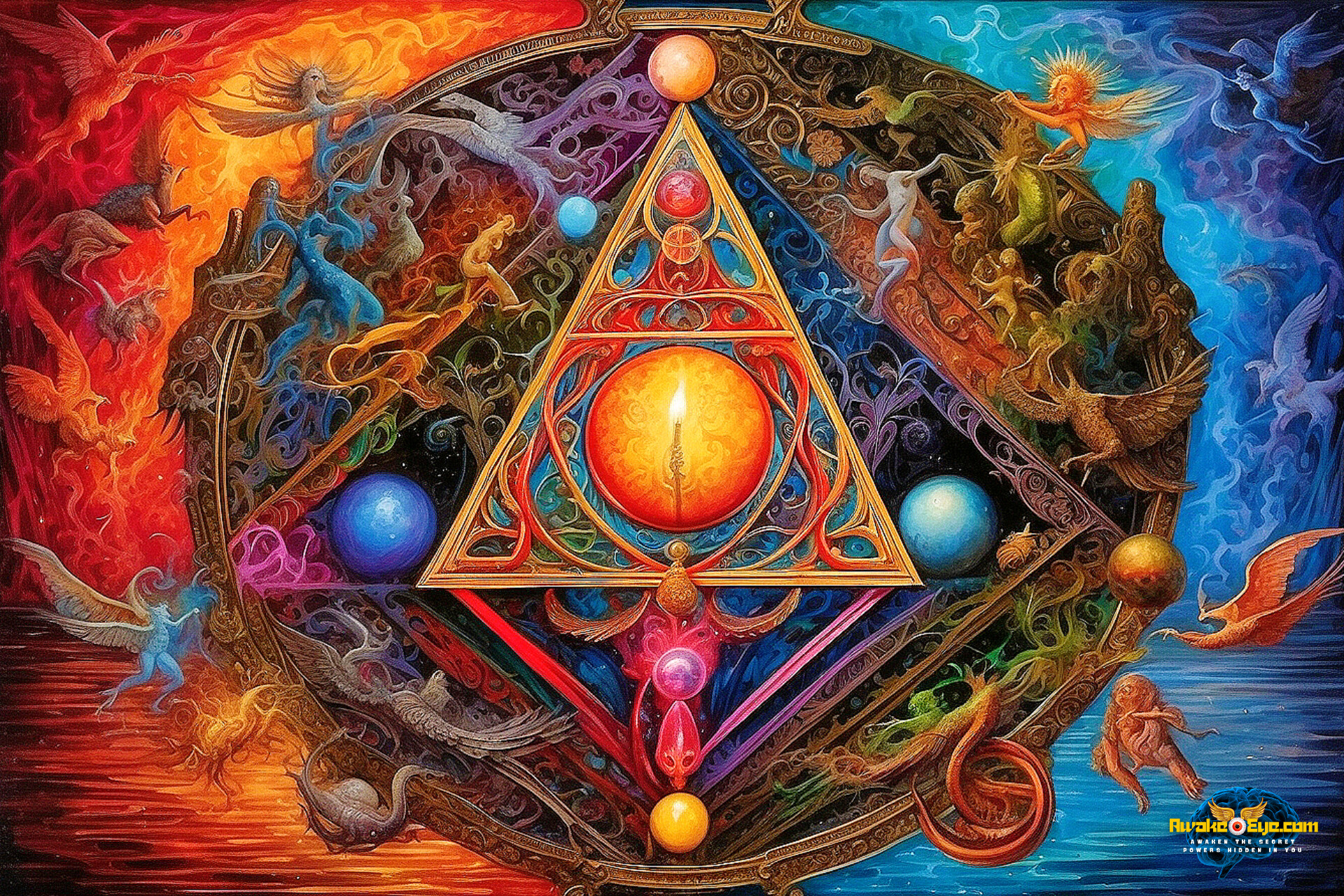Exploring the Depths: Delving into the Secrets of Hermeticism
Translate Post:
Welcome to an enlightening exploration of Hermeticism, an ancient philosophical tradition that has captivated seekers of wisdom for centuries. In this article, we’ll delve deep into the esoteric teachings of Hermeticism, uncovering its hidden truths, timeless principles, and practical applications for modern life.
Origins of Hermeticism: Tracing the Roots of Ancient Wisdom
Hermeticism, often referred to as the “Wisdom of Hermes,” is an ancient philosophical and spiritual tradition that has captivated seekers of truth for centuries. Its origins can be traced back to ancient Egypt, where the mythical figure of Hermes Trismegistus, also known as Thoth in Egyptian mythology, was revered as a god of wisdom, magic, and writing.
According to Hermetic teachings, Hermes Trismegistus was believed to be a legendary sage and philosopher who possessed profound knowledge of the mysteries of the universe. He was said to have authored a series of sacred texts known as the Hermetica, which contained teachings on metaphysics, cosmology, alchemy, astrology, and spirituality. These texts were later compiled into the Corpus Hermeticum, a collection of writings that became foundational to the Hermetic tradition.
The origins of Hermeticism can be further traced to the Hellenistic period, during which Egypt came under Greek influence following the conquests of Alexander the Great. This cultural blending gave rise to syncretic religious and philosophical movements, including the merging of Egyptian and Greek spiritual traditions, which contributed to the development of Hermeticism as we know it today.
One of the defining characteristics of Hermeticism is its emphasis on the concept of “as above, so below,” which reflects the interconnectedness of the macrocosm (the universe) and the microcosm (the individual). This principle suggests that the same patterns and principles that govern the cosmos also operate within the human psyche, implying a correspondence between the physical and spiritual realms.
Another key aspect of Hermeticism is its focus on spiritual evolution and self-transformation. Practitioners of Hermeticism seek to attain spiritual enlightenment and union with the divine through inner alchemy, a process of purifying and elevating the soul. This involves practices such as meditation, contemplation, ritual, and the study of sacred texts, all aimed at unlocking the hidden potentials within oneself.
The origins of Hermeticism are deeply rooted in ancient Egyptian and Greek traditions, blending myth, philosophy, and spirituality into a rich tapestry of wisdom. As seekers of truth continue to explore its teachings and practices, Hermeticism remains a source of inspiration and illumination for those who seek to understand the mysteries of existence.
The Seven Hermetic Principles: Foundations of Universal Law
At the heart of Hermeticism are the seven principles, also known as the “Seven Hermetic Principles,” which serve as the guiding lights of cosmic truth. These principles include Mentalism, Correspondence, Vibration, Polarity, Rhythm, Cause and Effect, and Gender, each offering profound insights into the nature of reality and the workings of the universe.
The Principle of Mentalism: As Above, So Below
Mentalism teaches that the universe is a mental construct, governed by the power of thought and consciousness. As above, so below; as within, so without. This principle reminds us of the interconnectedness of all things and the importance of mastering our thoughts to shape our reality.
The Principle of Correspondence: The Law of Correspondence
Correspondence elucidates the idea that there is harmony and correspondence between the various planes of existence, from the spiritual to the material. By understanding the patterns and parallels between these planes, we can gain deeper insights into the nature of existence.
The Principle of Vibration: Everything is in Motion
Vibration asserts that everything in the universe is in a state of constant motion and vibration. This principle reminds us that we are energetic beings, and our thoughts and emotions emit vibrations that attract like frequencies into our lives.
The Principle of Polarity: The Dance of Opposites
Polarity teaches that everything in the universe has its opposite and that these opposites are complementary aspects of the same whole. By embracing both light and shadow, joy and sorrow, we can achieve balance and harmony in our lives.
The Principle of Rhythm: The Ebb and Flow of Life
Rhythm acknowledges the cyclical nature of existence, with periods of expansion and contraction, growth and decay. By attuning ourselves to the rhythms of nature, we can flow with the currents of life and navigate its ups and downs with grace and resilience.
The Principle of Cause and Effect: The Law of Karma
Cause and Effect, often referred to as the law of karma, states that every action has a corresponding reaction. By taking responsibility for our thoughts, words, and deeds, we can consciously create the causes that lead to positive outcomes in our lives.
The Principle of Gender: The Dance of Masculine and Feminine
Gender highlights the dynamic interplay of masculine and feminine energies within all of creation. By embracing and integrating these energies within ourselves, we can achieve wholeness and harmony.
Applications of Hermetic Principles: Bringing Ancient Wisdom into Modern Life
While Hermeticism may seem Esoteric and abstract, its principles hold practical applications for navigating the complexities of modern life. From personal development and spiritual growth to business success and interpersonal relationships, the wisdom of Hermeticism offers guidance and insight into every aspect of human experience.
Hermeticism in Practice: Examples of Hermetic Principles in Action
Throughout history, individuals and organizations have applied the principles of Hermeticism to achieve profound transformations and breakthroughs. From the alchemical experiments of the Renaissance to the modern-day practices of manifestation and energy healing, Hermeticism continues to inspire and empower seekers on their spiritual journey.
Embracing the Wisdom of Hermeticism
In conclusion, Hermeticism offers a profound and timeless philosophy that illuminates the path to self-discovery, enlightenment, and fulfillment. By studying and applying its principles, we can unlock the secrets of the universe and harness the power of creation to manifest our highest potential.
FAQs
- Is Hermeticism a religion? Hermeticism is not a religion in the traditional sense but rather a philosophical and esoteric tradition that encompasses spiritual, alchemical, and mystical teachings.
- Can anyone practice Hermeticism? Yes, anyone with an interest in spiritual growth and self-discovery can explore the teachings of Hermeticism and apply its principles to their lives.
- Are there any recommended books or resources for learning about Hermeticism? Some recommended books on Hermeticism include “The Kybalion” by Three Initiates, “The Hermetica: The Lost Wisdom of the Pharaohs” translated by Timothy Freke and Peter Gandy, “The Secret Teachings of All Ages” by Manly P. Hall, “The Emerald Tablet: Alchemy for Personal Transformation” by Dennis William Hauck, and “The Secret Doctrine” by Helena Petrovna Blavatsky. These texts offer valuable insights into the principles and practices of Hermetic philosophy, providing readers with a deeper understanding of this ancient tradition and its relevance to modern spirituality.
- How does Hermeticism relate to other spiritual traditions? Hermeticism shares similarities with various spiritual traditions, including alchemy, Kabbalah, and mystical Christianity. It is often seen as a synthesis of ancient wisdom teachings from diverse cultures.
- Can Hermetic principles help with personal growth and self-improvement? Yes, Hermetic principles provide valuable insights and tools for personal growth, helping individuals cultivate self-awareness, inner harmony, and spiritual development.
- Is Hermeticism compatible with modern science and technology? While Hermeticism predates modern science, its principles resonate with many scientific concepts, such as quantum physics and the interconnectedness of all things. However, Hermeticism is more focused on metaphysical and spiritual realms rather than empirical scientific inquiry.
- How can one apply Hermetic principles in everyday life? By incorporating Hermetic principles into daily practices such as meditation, visualization, and mindful awareness, individuals can cultivate a deeper understanding of themselves and their place in the universe.
- Is Hermeticism solely focused on individual spiritual development, or does it have broader implications for society? While Hermeticism emphasizes personal spiritual growth, its principles also have implications for societal transformation, promoting values such as harmony, balance, and interconnectedness in human relationships and communities.











